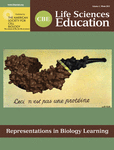Biology Education Research—A Cultural (R)evolution
This has been an exciting year in biology education research (BER). A National Research Council (NRC) report was published on discipline-based education research (DBER) that “investigates learning and teaching in a discipline from a perspective that reflects the discipline's priorities, worldview, knowledge, and practices” (Singer et al., 2012). A review of the BER literature that was commissioned for the report identified 195 studies reporting data on student learning, performance, or attitudes in college biology courses (Dirks, 2011). Although relevant articles appeared in more than 100 different journals, most were published in just four journals: Journal of Research in Science Teaching (established in 1963), Journal of College Science Teaching (established in 1994), Advances in Physiology Education (established in 1996), and CBE—Life Sciences Education (LSE; established in 2002). LSE published an impressive 50 articles, 26% of the total, demonstrating that the journal has become a leading venue for publishing BER findings.
However, BER as a discipline is quite young (DeHaan, 2011). A number of recent reports have highlighted major issues in undergraduate biology teaching and learning that remain largely unexplored, such as the:
consequences of teaching practices on the retention and long-term performance of biology majors (President's Council of Advisors on Science and Technology, 2012);
differences in the motivations, experiences, and outcomes of different biology learners (e.g., majors vs. nonmajors, minority vs. majority students; Singer et al., 2012);
mechanisms and outcomes of changes in teaching practices at the faculty and institutional levels (American Association for the Advancement of Science, 2011);
development of biology majors’ computational, quantitative, and data-management and data-mining skills (NRC, 2003); and
development of additional valid and reliable measures of biology student learning (Singer et al., 2012).

Generating this new knowledge will require expertise in biology, education theories, social science methodologies, and biology teaching that may only be realized through collaborations between biologists and social scientists. How can LSE help achieve this mingling of minds and perspectives? The journal will have to evolve as BER evolves. This evolution will not be easy, as LSE has two important sets of stakeholders: people who study biology teaching and learning and people who want to apply lessons learned from these studies in their teaching. Indeed, Singer and colleagues note (2012):
Tension exists between publication venues that are intended to share research findings among researchers and venues that are intended to inform instructors of the findings of DBER that might be useful in their classrooms. Publications intended for practitioners to support change in classroom teaching generally earn less professional recognition than research-focused journals and may have lower standards for the rigor of the research. High-quality research papers published in journals that practitioners are less likely to read may have less influence on classroom culture. (p. 37)
The editorial board of LSE has navigated this tension by publishing work that contributes to the development of knowledge and theory about biology learning, while also presenting practical strategies and outcomes that are approachable for biologists who teach. Indeed, results from a 2011 survey of LSE authors and readers revealed that authors (n = 227) chose to publish in the journal because it reached a biology researcher audience (89%), a BER audience (91%), and a biology teaching audience (90%). Readers (n = 664) indicated that they appreciated that the journal is written to reach a biology researcher audience (95%), a BER audience (92%), and a biology teaching audience (92%). Navigating this dualistic tension is growing more difficult, as the tools, methods, and results of BER become increasingly sophisticated. DBER scholars want more rigor and theory, while classroom practitioners want more real-world tools.
Perhaps the time has come for a cultural evolution, I daresay a revolution, that prioritizes communication and collaboration between those who study biology teaching and learning and those who are positioned to apply the results of this work. This evolution will require us to establish new cultural norms. Biology education researchers need to embrace the roles of translator, ensuring that BER is meaningful and relevant to classroom practitioners, and critical friend, providing developmental feedback to biology researchers learning to study teaching and learning. The biology community needs to recognize BER as a legitimate career path, and to formalize opportunities for undergraduate and graduate researchers to pursue this path. The doctoral and postdoctoral training of biology researchers needs to include opportunities to become familiar with the BER theory, methods, and results that are important for good teaching. And reading BER literature needs to become an integral part of preparing to teach. As Editor, I will do my best to foster this coevolution by maintaining the original intent of LSE: to publish studies of biology teaching and learning that meet a high standard of quality, while remaining approachable to professionals engaged in biology teaching. The tent of LSE is big enough for both camps to share, learn, and grow together.



